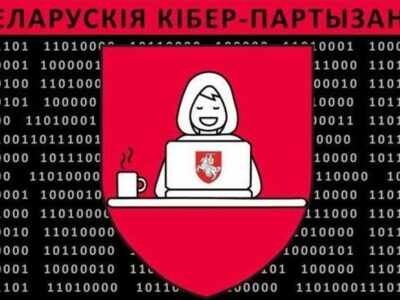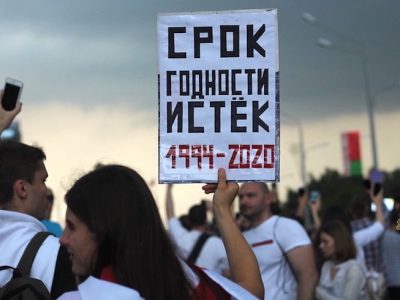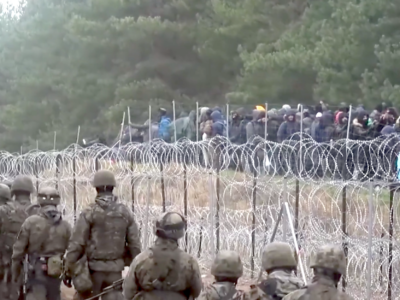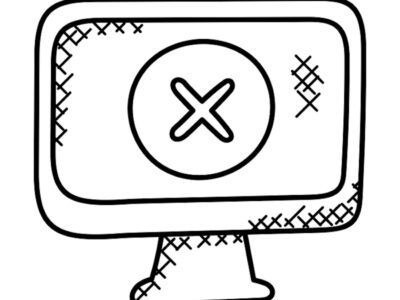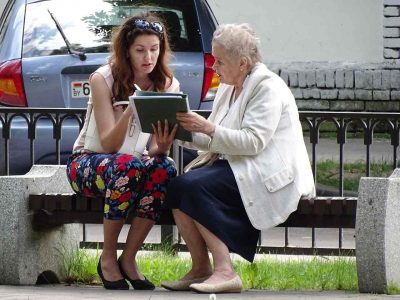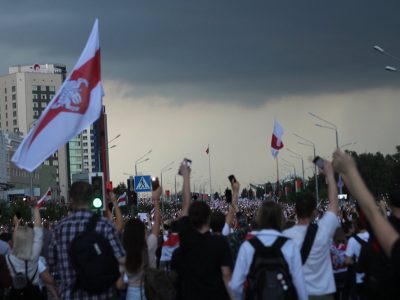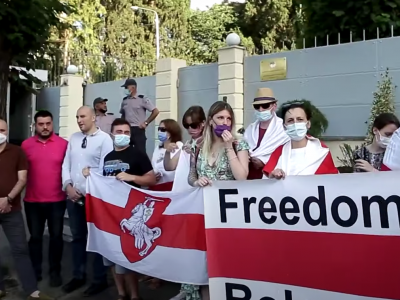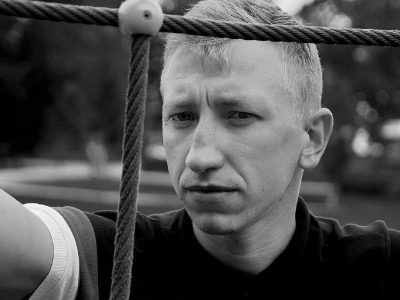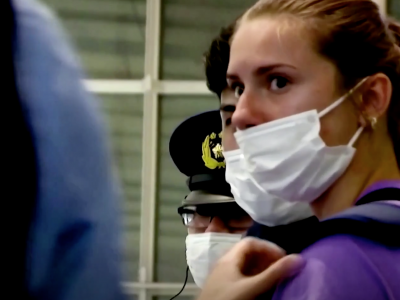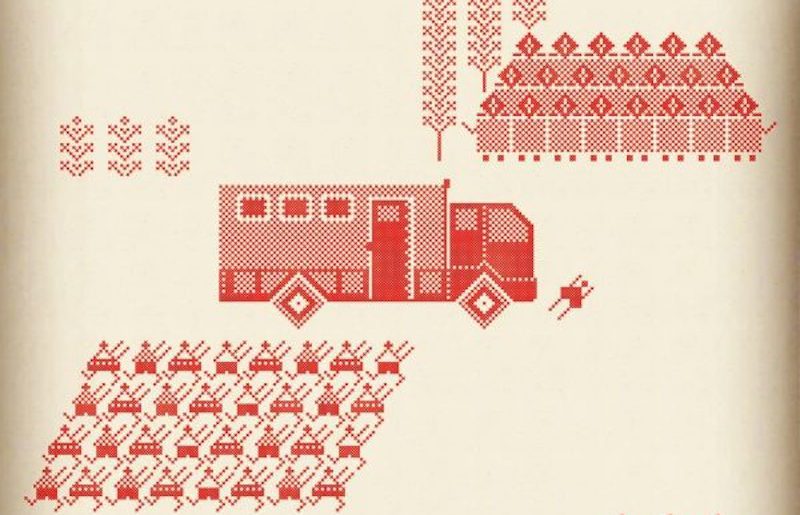
Embroidery by Prague-based Belarusian artist Rufina Bazlova, depicting a standoff between riot police and protesters in her home country. Image (c): Rufina Bazlova. Used with permission.
Belarus is undergoing perhaps its most serious political crisis since independence. This eastern European country of nearly 10 million has been ruled by President Alyaksandr Lukashenka since 1994. The former collective farm manager is a great survivor. For over 20 years he has outmanoeuvred political opponents, playing off Russia against the European Union and cracking down on dissent with ruthless efficiency. In the international press, he is known as Europe's last dictator. Meanwhile, he has held absolute power over Belarus, and expected his rule to continue.
Only one election in Belarus has ever been judged free and fair by international observers. Lukashenka appeared committed to continuing that tradition, breezing through elections in August 2020 to secure a sixth consecutive term as president. One by one, his most promising challengers were ejected from the race. The popular blogger Syarhei Tsikhanouski was detained at the end of May 2020 on suspicion of being a foreign agent. The businessman Viktar Babaryka, whose candidacy was rejected, was detained in mid-June. In late July, the entrepreneur Valery Tsepkalo, whose candidacy was likewise rejected, fled to Russia fearing political persecution. Sporadic street protests began to be held in June. The protesters were arrested and Lukashenka reacted as expected — by deriding them as the paid lackeys of undefined foreign powers.
But when Tsikhanouski's wife, Sviatlana Tsikhanouskaya, registered as a presidential candidate in his place, the opposition to Lukashenka was able to unite around a new figure. Tsikhanouskaya's goal was simple: to resign after six months, by which time free and fair elections would be held. But when the official results were announced on the morning of August 10, Belarusians found them implausible. Lukashenka had allegedly received 80 percent of the vote compared to just ten percent for Tsikhanouskaya.
The situation has since deteriorated. Tsikhanouskaya has fled to neighbouring Lithuania. Thousands of Belarusians have been protesting across the entire country, which has seen internet shutdowns, labour unrest, a crackdown on independent journalists, and credible accounts by detained protesters of torture at the hands of the security services. Several protesters are reported to have been killed in clashes with riot police, and at least one has died in prison. Many observers now believe that whatever goodwill there once was towards Lukashenka has evaporated. If he rules, he will depend on fear to a degree unprecedented by Belarusian standards. His opponents are all too aware of that prospect.
With growing pressure and sanctions from Western powers, compromise looks improbable, as protesters and the opposition now demand nothing less than a full recount of the results and Lukashenka's resignation as president of Belarus.
Stories about Belarus In Turmoil
Belarusians returning home from immigration receive criminal charges
Human rights defenders say that despite the "agreements," criminal cases were initiated against people who believed the authorities and returned to Belarus.
Members of Belarusian band behind 2020 protest songs receive draconian sentences
"We are not cattle, cattle and cowards, we are a living people, we are Belarusians!" sang the Tor Band. Now their member are in prison with sentences up to nine years.
Without the ability to renew their passports abroad, Belarusians in exile are left in limbo
Belarusian leader Lukashenka signed a decree saying Belarusians living abroad will not be able to renew their passports at consulates abroad.
The West’s Belarus policy: Does it make sense?
By damaging Belarus’s ability to act on its own and not achieving any positive results, the blockade of Belarus by its Western neighbors has been manifestly counterproductive, leading to excessive dependency on Russia
‘People in Belarus live in constant terror, fearing a system that can arbitrarily target anyone’
"Our human rights work in Belarus involves direct action. We engage in activities such as collecting resources, learning to purchase necessary items and communicating with the families of political prisoners."
#FramedinBelarus: An art group makes embroidery depicting the stories of political prisoners
The project aims to create portraits of each illegally convicted citizen in Belarus (political prisoners) using the traditional Belarusian embroidery technique of red thread on a white background
Belarusian cyberactivists claim railway system hack to protest Russian troop movements
The hacker collective said it would be prepared to hand over encryption keys if 50 Belarusian political prisoners were released and the presence of Russian troops in Belarus was “prevented.”
Google removes YouTube ads featuring interrogations of Belarusian political prisoners
The short videos, used to promote pro-government channels, feature opposition members and independent journalists imprisoned by the Lukashenka regime in what look like forced confessions made under duress.
Belarus, transformed: political analysts track social and political change in the country
"The Belarusians have re-envisioned their national identity, giving birth to a new civil society and reformatting social processes that generate new patterns of behavior."
Poland reinforces border with Belarus as migrant crisis escalates
The EU had previously accused Belarus' Lukashenka of flying in migrants from the MENA region and South Asia and bringing them to the EU's borders to retaliate against sanctions.
Belarus authorities block access to more independent media added to extremist list
The websites of Deutsche Welle, Current Time and the employees and readers of BelsatTV and NEXTA are the latest targets in Belarus' ongoing crackdown on independent media and free expression.
Cats, crows and planet Earth: drawings by Belarusian political prisoners
Drawings sent to friends and family by Belarusian political prisoners, detained in a crackdown after the 2020 elections, provide an insight into their lives.
In Belarus, subscribing to Telegram channels branded as ‘extremist’ may now get users in trouble
While it's not clear whether the Belarusian police will actually be able to dispense prison terms, "nobody can be sure" they won't be criminally charged for subscribing to Telegram channels.
Belarusian authorities rule to liquidate domestic violence shelter
The liquidation of Radislava is part of an ongoing crackdown on NGOs, independent media, and activists in Belarus that intensified this summer following a year of protests against fraudulent elections.
‘If you thirst for freedom, seize it!’: The songs of the Belarusian uprising
The songs of protest that have become some the most vital symbols of the 2020 Belarusian revolution are varied in their origins and surprising in their complexity.
Georgian-Belarusian security cooperation deal worries political emigres in Georgia
A year after disputed presidential elections in Belarus, a Georgian-Belarusian security cooperation agreement has come into force. Critics fear the treaty could help Minsk target political dissidents residing in Georgia.
Belarus court labels independent media outlets Tut.by, Zerkalo.io as ‘extremist’
The ruling applies to every single piece of content on the Tut.by and Zerkalo.io websites, as well as to all content posted on their social media channels.
Missing Belarusian activist found dead in Ukraine
Shyshou, who left Belarus in the autumn of 2020 fearing state persecution, founded the Belarusian House in Ukraine, an organisation supporting Belarusian citizens fleeing regime persecution.
Belarusian sprinter sent home from Olympics by Belarusian officials says she will ask for asylum
24-year-old Krystsina Tsimanouskaya said she was not worried about being kicked off the national team, but was afraid she would be imprisoned once she arrived in Belarus.
State escalates attacks on media freedom and civil society in Belarus
Since the start of July, dozens of civil society organisations and independent media outlets in Belarus have faced law enforcement raids, searches and staff detentions.
Top Belarusian media website removes social media posts to protect employees
Tut.by editors removed virtually all of the content published on most of their social media channels in 2020 and the first half of 2021, at the height of the post-election protests.








